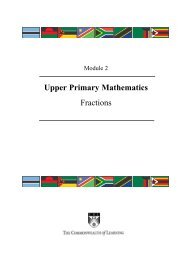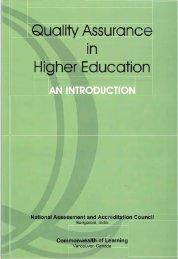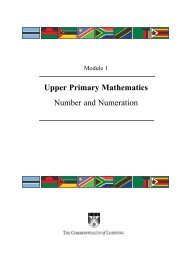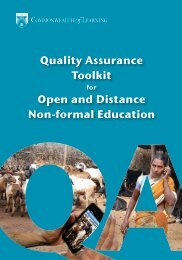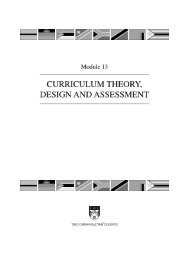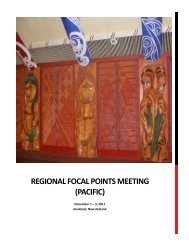Tech-MODE for Agricultural Education and Improved Livelihoods in ...
Tech-MODE for Agricultural Education and Improved Livelihoods in ...
Tech-MODE for Agricultural Education and Improved Livelihoods in ...
Create successful ePaper yourself
Turn your PDF publications into a flip-book with our unique Google optimized e-Paper software.
SYNTHESIS OF EIGHT COUNTRY CASE STUDIES<br />
document an <strong>in</strong>ventory of local <strong>in</strong>stitutions, facilities <strong>and</strong> capabilities <strong>for</strong> <strong>Tech</strong>-<br />
<strong>MODE</strong>, as well as describe the learn<strong>in</strong>g needs that can be addressed through <strong>Tech</strong>-<br />
<strong>MODE</strong>. The country studies will be discussed <strong>for</strong> further action dur<strong>in</strong>g this<br />
workshop <strong>and</strong> eventually presented at the FARA General Assembly, June 2007.<br />
Expected outcome. Suggestions <strong>for</strong> further action on COL’s complementary <strong>and</strong><br />
catalytic role <strong>in</strong> collaboration with strategic partners, such as FARA, on <strong>Tech</strong>-<br />
<strong>MODE</strong> <strong>in</strong> agricultural education <strong>and</strong> improved livelihoods <strong>in</strong> sub-Saharan Africa.<br />
Procedure. Participants will be the case study collaborators <strong>and</strong> additional<br />
attendants, <strong>in</strong>clud<strong>in</strong>g participants from the preced<strong>in</strong>g AOER workshop.<br />
Ra<strong>in</strong>er Zachmann expla<strong>in</strong>s the procedure <strong>and</strong> presents a key question that should<br />
lead to the expected outcome:<br />
What are the challenges <strong>for</strong> COL’s complementary <strong>and</strong> catalytic role <strong>in</strong> collaboration<br />
with strategic partners on <strong>Tech</strong>-<strong>MODE</strong> <strong>for</strong> agricultural education <strong>and</strong> improved<br />
livelihoods <strong>in</strong> sub-Saharan Africa?<br />
Throughout the follow<strong>in</strong>g presentations, workshop participants note down<br />
keywords related to the key question on A5-size cards. 1-3 words, 1 subject per<br />
card, felt-tip pen, large lower-case letters (no CAPITALS !).<br />
Country collaborators present the executive summary <strong>and</strong> conclusions of their<br />
country reports (15 m<strong>in</strong>utes each + 10 m<strong>in</strong>utes <strong>for</strong> clarifications).<br />
Someone else describes other <strong>in</strong>itiatives <strong>in</strong> SSA (SCARDA, RAILS, BASIC, …)<br />
Krishna Alluri describes possibilities <strong>and</strong> limitations of COL.<br />
Workshop participants jo<strong>in</strong>tly classify the collected keywords <strong>in</strong>to subject<br />
categories.<br />
Participants grouped around subject categories elaborate suggestions accord<strong>in</strong>g to<br />
the expected workshop outcome (30-60 m<strong>in</strong>utes). Depend<strong>in</strong>g on time, groups may<br />
rotate to allow <strong>in</strong>teraction.<br />
Groups present their suggestions to the plenary.<br />
On 9 <strong>and</strong> 10 June 2007 we will cont<strong>in</strong>ue discuss<strong>in</strong>g the challenges <strong>and</strong> suggestions<br />
at a COL-FARA Side Meet<strong>in</strong>g <strong>in</strong> S<strong>and</strong>ton with additional stakeholders. On 15 June<br />
2007 between 11:00 – 11:20, we will have 5 m<strong>in</strong>utes to report the outcome to the<br />
FARA General Assembly.<br />
12 ■ TECH-<strong>MODE</strong> FOR AGRICULTURAL EDUCATION AND IMPROVED LIVELIHOODS IN SUB-SAHARAN AFRICA: COUNTRY CASE STUDIES



